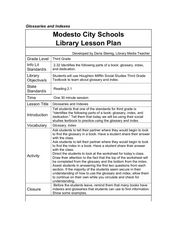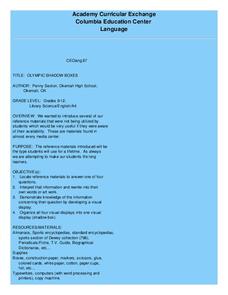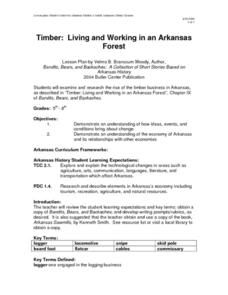NET Foundation for Television
1850-1874 Notable Nebraskan: J. Sterling Morton
What are the characteristics of an outstanding citizen? Nebraskan J. Sterling Morton contributed to the formation of societal and family values in his state. Learners gather information on Morton's life accomplishments from primary...
PBS
Using Primary Sources: Wide Open Town
A picture speaks a thousand words, no matter how old! Scholars use political cartoons from the era of Prohibition and the Temperance Movement to analyze what, a primary document (in this case, a bootlegger's notebook) is telling them...
Museum of Tolerance
Immigration Journeys
Through the journey of four stories of immigration, scholars complete graphic organizers and apply knowledge to create a visual representation of their findings on a large poster. Third and fourth readers write a letter to their family...
University of California
Containing Communism Abroad
Learn more about the policy of the United States to contain communism during the Cold War. The fifth installment of an eight-part series looks at primary and secondary materials about a challenging time in history. After analyzing the...
Facing History and Ourselves
The World the War Made
The United States Civil War forced Northern and Southern societies, as well as the people who made up those societies, to reconstruct their vision of themselves and their identities. A series of video-based web lessons look at the great...
Facing History and Ourselves
Literature and Imagination Make Democracy Work
The final instructional activity in the "What Makes Democracy Work?" series examines the connections between imagination, literature, and democracy. Class members listen to a podcast, read an excerpt from Azar Nafisi's, The Republic of...
J. Paul Getty Trust
Picturing a Story: Photo Essay about a Community, Event or Issue
Picture this. Class members follow in the footsteps of W. Eugene Smith, Dorothea Lange, James Nachtwey, and Lewis Hine by creating their own photo essay about a local event or issue.
Middle Tennessee State University
The Declaration of Independence: Its Legacy and Ideas in Today’s World
How is it possible that such an old document still triggers modern discussions? Teach scholars why the Declaration of Independence is still so important today using an informative resource. They watch various educational videos, work in...
Facing History and Ourselves
Why Little Things Are Big
Often our decisions are impacted by a fear of how others see us. That's the big idea in a two-day lesson that asks how false assumptions, how our fear of how others may see us, impact how we act. After watching a video about such a...
Facing History and Ourselves
Standing Up to Hatred on Cable Street
The final lessons in this section of the Standing Up for Democracy unit ask class members to consider ways they can help create a "more humane, fair, and compassionate environment" in their communities. For context, learners study how...
Facing History and Ourselves
Defining Freedom
The Emancipation Proclamation freed slaves in the Confederate states. The Thirteenth Amendment banned slavery in the United States. However, neither document defined freedom. The second lesson in the Reconstruction Era series examines...
Facing History and Ourselves
Free Press Makes Democracy Work
A unit study of the importance of a free press in a democracy begins with class members listening to a podcast featuring two journalists, one from a United States public radio station and one from Capetown, South Africa. The lesson plan,...
Curated OER
Glossaries and Indexes
Fourth graders identify parts of a book including the glossary, index, and dedication. In this glossary and index activity, 4th graders complete a worksheet after studying the glossary and index from a Houghton Mifflin Social Studies...
Curated OER
OLYMPIC SHADOW BOXES
Students acquaint themselves with little-used library resources/reference materials and create shadow boxes to be displayed in the Media Center based on the research they've done regarding the Winter Olympics.
Curated OER
Timber: Living and Working in an Arkansas Forest
Upper elementary and middle schoolers examine and research the history of the Timber Industry in the state of Arkansas. An economic component is quite prevalent in this lesson as well. Groups of learners work together to write essays...
Curated OER
Korean Foods
An interesting lesson to find more information about the subject of Korean foods and their origins in culture. The topics surrounding mealtime, such as religious traditions and etiquette are researched in order to put together a key note...
Curated OER
Animal Habitats: 1st Grade
Learning about animal habitats can be a lot of fun. This lesson focuses on how God created different habitats to suit different animal needs. Students will conduct library research in order to create a five page habitat slide show using...
Curated OER
Are You Sure You've Got the Right Answer?
Young researchers work through the research cycle. They question, plan, gather, sort, synthesize, and evaluate the materials they collect at the library. There are web supplements for this lesson plan.
Curated OER
What is a Biography?
Investigate biographies with your class. Compare autobiographies and biographies of Martin Luther King, Jr. as an example. Learners explore the factual components that make up a biography and locate several biographies of notable...
Curated OER
Sunburns and Sore Muscles: Working to Save the Farm During the Great Depression
Fifth through eighth graders engage in a lesson in which they study working class people during the Great Depression. They work to develop an understanding of the economic developments in Arkansas during the 1930's. Learners access...
Curated OER
An Illustrated Guide to the Late 1800's
Eleventh graders investigate the time of the late 1800's. They conduct research using a variety of resources that could include the internet. Students create an alphabetized encyclopedia of important historical people of the time period.
Curated OER
Road To Roota
Did you know that there are comic books that can help learners discover economic concepts like supply and demand. The format of this lesson is highly engaging and enables them to discover how economics can be an exciting field of study....
Curated OER
Government Lesson Plan: Lesson Plan 12
Learners investigate various political systems around the world. They complete a chart that compares the U.S. political system with other nations' governments, conduct research on a selected nation, and present an oral report.
Curated OER
Alphabet
Primary learners will make posters, trace letters, and eat letter cereal, all to learn about the alphabet. They will also go on a scavenger hunt around the room looking for letters. This resources has lots of ideas for bringing about...

























